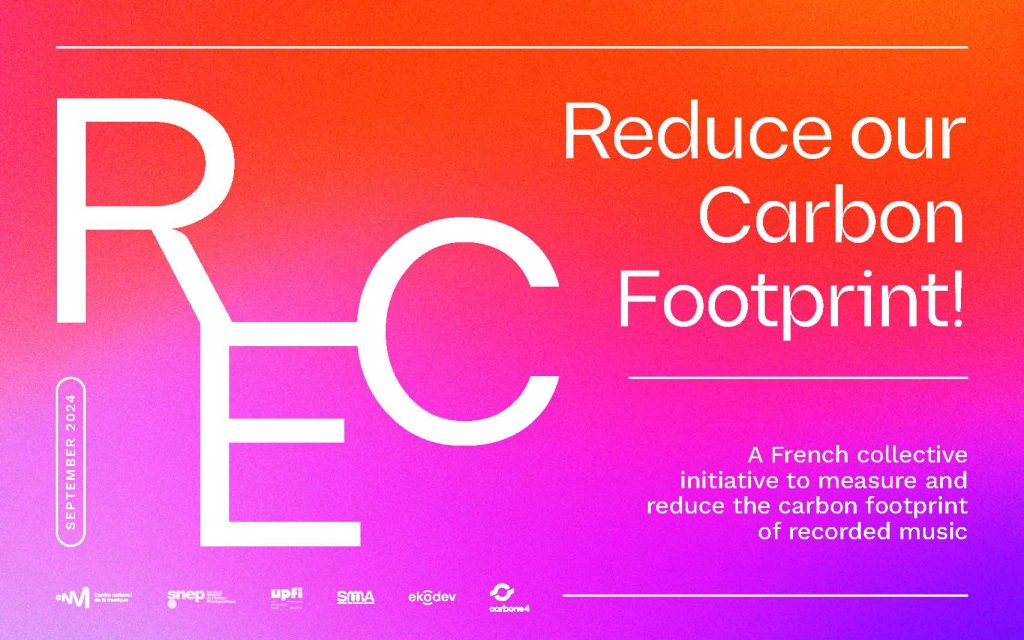A French collective initiative to measure and reduce the carbon footprint of recorded music

This Wednesday, September 18, at the Académie du Climat in Paris, the Centre national de la musique (CNM) and producers from Snep, UPFI, and SMA released the results of the REC project ‘Réduisons notre empreinte carbone ! / Reduce our Carbon Footprint!’: an assessment of greenhouse gas emissions from the recorded music sector distributed by French players, a projection of these emissions by 2030, and a first collective roadmap to initiate decarbonization
In recent years, awareness of carbon impact and the need to integrate this issue into their strategies has accelerated among professionals in the recorded music industry. The Centre national de la musique and the trade unions representing phonogram producers and distributors in France, the Syndicat national de l’édition phonographique, the Union des producteurs phonographiques français indépendants and the Syndicat des musiques actuelles, have decided to collectively lead the REC project (“Reduce our carbon footprint!”) as part of the “Alternatives vertes” call for projects, launched in 2021 by the ministère de la Culture and the Secrétariat général pour l’investissement for Investment, and steered by the Banque des Territoires as part of France 2030.
As winner of the first version of this call for projects, the REC project aims to measure the recorded music industry’s carbon footprint in order to contribute to reducing it. The project sand out to observe the greenhouse gas emissions of French productions listened to in France and abroad, and of international productions distributed by French players, taking music’s complete life cycle, from production to listening, as its perimeter.
Data was collected from twenty-five volunteer organisations (three large companies, eleven medium to large labels/distributors, six small labels, a streaming platform, a CD and vinyl record manufacturer and three recording studios), and extrapolated to give an overall estimate of emissions from the recorded music industry of around 2,780 kilotonnes CO2e for 2022, representing more than one million return journeys by plane between Paris and New York.
In addition to this diagnosis, forward-looking trends predict a risk of emissions tripling between 2022 and 2030, mainly due to market growth and the increase in audio and video quality.
To decarbonise its activities, better understand future regulations and make its contribution to fighting the climate crisis, the French recorded music production and distribution industry has decided to formalise a low-carbon strategy based on the underlying data and issues highlighted in the first diagnostic phase. Thirty-five professionals from all backgrounds were mobilised to put forward ideas and recommendations for the roadmap, which was then co-drafted by the trade unions and the CNM.
Manufacturing and end-of-life terminals needed to listen to music played a major role in the recorded music industry’s overall footprint in 2022, accounting for 51% of emissions. The levers for reducing this item are shared with other stakeholders who will have to be consulted, whether they are within the music industry or other sectors and industries. To this end, the roadmap sets out recommendations to be addressed to the partners of music industry professionals, in a spirit of collective, multi-industry and global responsibility.
Accounting for 22% of emissions, the digital distribution of recorded music should also be examined, especially as projections tend to show that the climate impact of this activity is likely to increase sharply. To this end, it is planned to refine the diagnostics to enable the identification of sustainable reduction actions. This could be done at two levels: micro, with the development of self-diagnosis tools; macro, by specifying certain aspects of the REC project, in particular by creating common evaluation guidelines.
Because 23% of the industry’s emissions concern uses, active public awareness-raising will have to be undertaken. This can only be done by mobilising all the stakeholders in the music ecosystem, and more specifically in the recorded music industry, with artists at the forefront, and with the support of the media, physical distributors and online music distribution platforms (both primary and secondary).
Lastly, the industry’s professionals will not be able to get involved without aligning their skills and making a commitment to act on their emissive positions (this will involve raising awareness and adapting training courses). A significant part of the roadmap is therefore devoted to raising awareness and to adapting of initial and continuing training programs.
The REC project is a preliminary but essential step towards awareness about the issues involved and decarbonising the recorded music industry. Its collective nature has made it possible to lay the foundations for concrete and viable actions to curb the industry’s emissions curve. But the range of levers to be activated is much broader than those in the hands of recorded music producers and distributors alone. For this reason, the project partners propose that the steering committee involved in this project be made permanent and extended, to ensure that the present roadmap is properly followed up and consider extensions to it. SNEP, UPFI and SMA are committed to this, as is the CNM, which has coordinated this collective initiative. We are all convinced that it is urgent to take action both on decarbonisation – which is only one facet – and, more broadly, on the environmental, social and societal sustainability of our activities.

